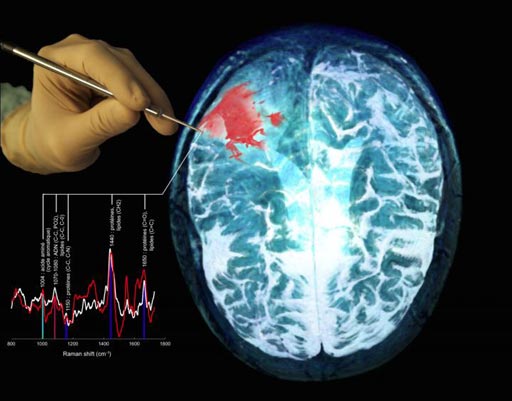Novel Intraoperative Probe Developed for Cancer Surgery
By MedImaging International staff writers
Posted on 03 Jul 2017
An innovative intraoperative probe for detecting different types of tumor cells has been developed by researchers in Canada.Posted on 03 Jul 2017
The multimodal hand-held Raman optical spectroscopy probe enables surgeons to detect nearly all cancer cells during brain surgery.

Image: A depiction of the new multimodal probe in use during surgery, together with a Magnetic Resonance Imaging (MRI) scan of a brain cancer patient, showing the tumor in red (Photo courtesy of Frédéric Leblond and Kevin Petrecca).
The scientists from the Polytechnique Montréal (Montréal, Canada), and two other hospitals and Universities developed the hand-held Raman spectroscopy probe. The device is now accurate, sensitive and specific enough for detecting brain, colon, lung, and skin cancer cells. During intraoperative testing the probe showed nearly 100% sensitivity for detecting cancer cells. Details of the breakthrough technology were published in the June 28, 2017, issue of the American Association for Cancer Research journal Cancer Research.
The unique feature of the new second-generation system is that it can be used in real-time, during a surgical procedure, to detect cancer cells. The multimodal probe uses intrinsic fluorescence spectroscopy, and diffuse-reflectance spectroscopy technologies. A randomized clinical trial is currently under way using the first-generation Raman spectroscopy probe for patients with gliomas, and will help researchers develop a protocol for a clinical trial of the new second-generation multimodal probe.
Chief of Neurosurgery, brain cancer researcher Dr. Petrecca, said, "Minimizing, or completely eliminating, the number of cancer cells during surgery is a critical part of cancer treatment, yet detecting cancer cells during surgery is challenging. Often it is impossible to visually distinguish cancer from normal brain, so invasive brain cancer cells frequently remain after surgery, leading to cancer recurrence and a worse prognosis. Surgically minimizing the number of cancer cells improves patient outcomes. A technology with extremely high accuracy is necessary, since surgeons will be using this information to help determine if tissues contain cancer cells or not."
Related Links:
Polytechnique Montréal










 Guided Devices.jpg)



